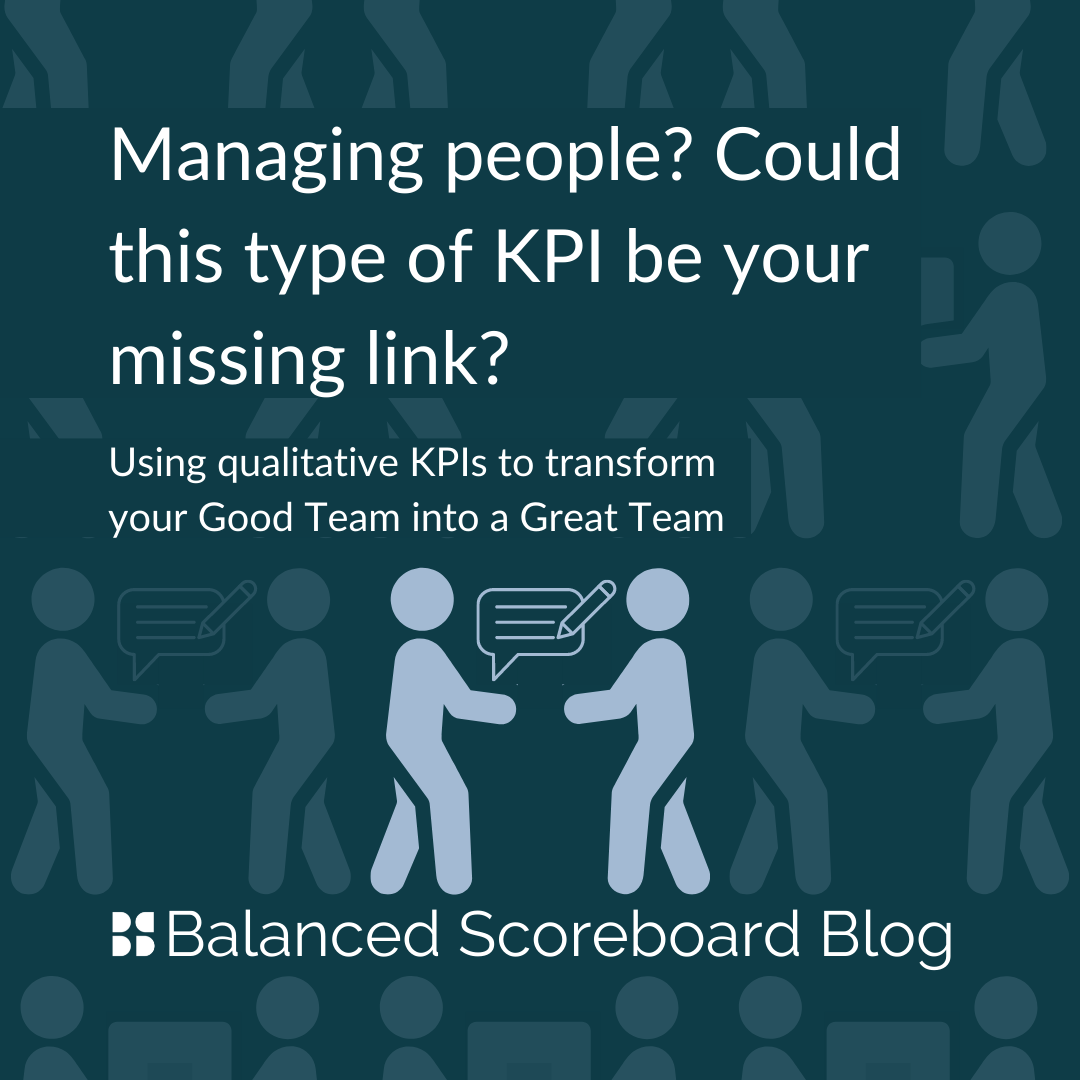Managing people? Could this type of KPI be your missing link?

Using qualitative KPIs to transform your Good Team into a Great Team
Why are performance reviews often dreaded, when research shows that employees want measures to clarify what they need to achieve to be successful.
Find out what the secret to meaningful measures are, and how getting them right can be key to the effectiveness of reviews.
Do employees like their performance to be measured?
Is it that team members just don’t like being subjected to performance measures? No, that’s not it. Research shows employees like measures that clarify what they need to achieve to be successful. Gallup’s recent Re-Engineering Performance Management paper found that employees like performance measurement for 3 reasons:
- to develop them
- to keep them accountable and
- to give them specific recognition
Employees want these three performance objectives from their manager and organisation. The Gallup research identified that employees are 2.5 times more likely to be engaged in their job when kept accountable for their performance.
So why then, if employees like their performance to be measured, do they often find performance reviews stressful, demeaning and demotivating?
It’s because the performance measures being used are often inappropriate or, at best, incomplete. When appropriate measures are used correctly, employees find them motivating.
Measuring ‘the whole picture’ of employee performance
Broadly speaking, there are two types of performance measures:
- Quantitative measures
- Qualitative measures
Quantitative Key Performance Indicators (KPI’s) are for aspects that are readily measured: Numbers, dollars, percentages and so on.
Qualitative KPI’s are for aspects that can’t usually be objectively reduced to a number. They are often inherently subjective, which can be a challenge.
However, traditional quantitative performance measures such as productivity, sales or write-offs are—in isolation—a narrow and potentially demeaning measure. Quantitative KPI’s do not give the full picture of an individual’s performance and contribution and can make employees feel they are being ‘reduced to a number’. A focus exclusively on quantitative KPI’s can also risk promoting behaviours that undermine culture such as unhealthy competitiveness, lack of teamwork and disengagement.
As a result, performance and business outcomes are reduced.
WHAT’s been achieved vs HOW it’s been performed
It’s understandable why businesses have traditionally tended to focus on quantitative KPI’s that relate to productivity, production and profitability: These numbers are clear, useful and easy to measure.
For example, accounting firms utilise productivity and write offs to measure what their employees have achieved. However, these measures do not capture how a team member has performed. If a Senior Accountant exceeds their productivity but ignores duties such as mentoring their team, meeting compliance standards or developing themselves, these quantifiable KPIs do not paint the whole picture of their performance, particularly when you consider longer term objectives.
In this scenario, such a team member is rewarded by the business, but they actually have a negative effect on team morale, development and performance.
The effect on team culture
One industry that focused primarily on quantitative measures in the past is financial planning. Legislation now dictates that team members within financial planning practices cannot be rewarded solely on financial results. While this is designed to improve the quality of service and advice provided, it has left many financial planning businesses having to rethink their entire remuneration models. Many are struggling to identify objective ways of measuring their team members’ performance beyond their financial measures.
This is precisely where clear and concise qualitative KPIs come into play.
The guiding principle here is that leaders need to gather a holistic picture of each team member’s performance, recognising that how the business objectives are reached is just as important as achieving the objective numbers.
The purpose of Qualitative KPIs
The purpose of qualitative KPIs is to measure how team members:
- Contribute to the workplace culture
- Demonstrate and role model the organisation’s core values and behaviours
- Lead, mentor and coach others
- Conduct themselves with clients and other team members
- Meet organisational quality and industry standards
- Comply with legislative requirements
- Are accountable and take ownership of their responsibilities
- View themselves within the organisation and how engaged they are as a result.
Qualitative KPIs are also useful for identifying the learning and developmental needs of team members.
The effect qualitative KPIs will have on your performance reviews
When you include qualitative KPIs in your performance reviews, you find that rewards are more equitable and motivating. As Robert Bacal, a performance expert advises, employees need to know:
- what they need to do
- when, and
- how well.
If they don’t, how can they possibly succeed?
With the ‘what’ and ‘how’ in place, you are providing the clarity employees want from you as leaders as well as providing a fair framework for recognising and rewarding your team members.
Through this process, you will be able to unleash the potential of your team members. Your organisation can develop engaged team members who:
- know what they need to do
- have the skills to do it, and
- can see how their work fits into the overall business objectives.
Where Balanced Scoreboard fits in
The team at Balanced Scoreboard have developed tried and tested methods and tools to guide businesses with a structured talent management framework for enhanced team engagement, performance recognition, and job satisfaction.
For further information, contact the performance specialists at Balance Scoreboard via [email protected] or go to www.balancedscoreboard.com.au to view or book a demonstration of the Balanced Scoreboard platform.
Let the Team at Balanced Scoreboard help you incorporate qualitative and quantitative KPI’s that will help your business reach its potential by transforming your good team into a great team.
Balanced Scoreboard® is a registered trademark of Altitude Innovations © 2021. All rights reserved